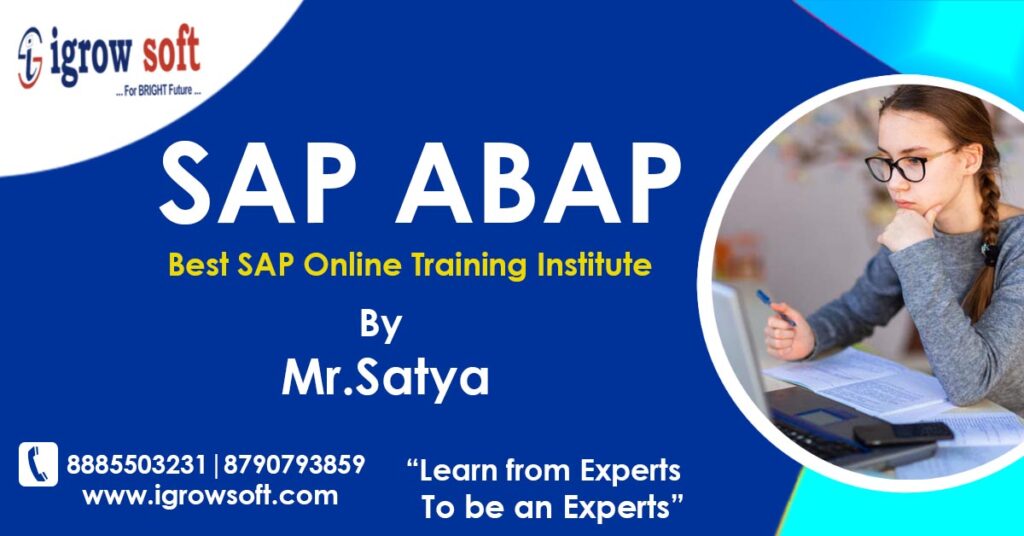
What is SAP ABAP?
System, Applications, and Products in Data Processing (SAP) developed the programming language SAP ABAP (Advanced Business Application Programming) for the creation and customization of applications within the SAP environment. The SAP ERP (Enterprise Resource Planning) system and other proprietary SAP software are primarily programmed in ABAP.
Listed some of the key aspects of SAP ABAP:
Functionality: Developers can create and improve SAP applications using ABAP’s robust set of features and functionalities. It enables programmers to create modular, reusable code by supporting procedural and object-oriented programming paradigms.
Integration: The database layer, user interface, and business logic of the SAP system can all be integrated more easily thanks to ABAP. It can communicate with many different SAP modules, including Finance (FI), Sales and Distribution (SD), and Materials Management (MM).
Data Dictionary: Developers can define and manage data structures like tables, views, data types, and domains using ABAP’s robust data dictionary. The SAP system’s data dictionary ensures data consistency and integrity.
User Interface: ABAP supports the development of user interfaces using a number of techniques. It offers resources for creating menus, screens, and reports that let customers interact with SAP applications. Other user interface technologies like Web Dynpro and SAP GUI (Graphical User Interface) are also integrated with ABAP.
Database Access: Developers can access and modify data in the underlying database system using ABAP. It has built-in tools and commands for quickly retrieving, modifying, and aggregating data. Numerous database systems are supported by ABAP, including SAP HANA, the company’s own database system.
Reporting and Analytics: The reporting and analytics capabilities provided by ABAP are extensive. In order to derive useful insights from the data stored in SAP systems, developers can create unique reports, queries, and analytical applications. ALV (ABAP List Viewer) grid, SAP Query, and ABAP-based analytical tools are features supported by ABAP.
Business Logic: . Business rules and logic can be implemented in SAP applications using ABAP. To specify workflows, validations, calculations, and other business processes, developers can write ABAP code. In order to communicate with external systems, ABAP also supports a number of integration technologies, including IDoc (Intermediate Document), BAPI (Business Application Programming Interface), and RFC (Remote Function Call).
Enhancements and Modifications: SAP standard functionality can be modified and extended using ABAP’s built-in tools. Using methods like BAdIs (Business Add-Ins), user exits, and enhancement spots, developers can improve existing SAP applications without altering the original source code. This makes upgrades simpler and lowers the chance of system inconsistencies.
Performance Optimization: SAP application performance analysis and optimization tools and methods are provided by ABAP. The performance bottlenecks in ABAP programes can be found and fixed using tools like SAT (ABAP Runtime Analysis) and SQL Trace.
Security: To safeguard SAP systems and data, ABAP includes strong security measures. To ensure the privacy, accuracy, and availability of SAP applications, it offers features like user authentication, authorization checks, and data encryption.
Overall, SAP ABAP Course is a versatile programming language that enables developers to create, customize, and enhance SAP applications. It supports the entire lifecycle of an SAP solution, from design and development to deployment and maintenance.
The scope of SAP ABAP in the Future?
The SAP ERP (Enterprise Resource Planning) system can be customized and applications developed using the SAP ABAP (Advanced Business Application Programming) language. The SAP ecosystem still heavily relies on ABAP, despite the attention given to newer technologies like SAP HANA and SAP FIORI.
The adoption of more recent SAP technologies and the conversion of existing systems to these technologies determine much of the scope for SAP ABAP.
- Transition to SAP S/4HANA: The next-generation SAP ERP system, known as SAP S/4HANA, offers improved performance and functionality. It is built on the in-memory database platform SAP HANA. ABAP developers will be required as businesses continue to migrate from legacy SAP ERP systems to SAP S/4HANA in order to adapt and customize the new environment.
- Ongoing Support and Maintenance: Numerous businesses have significant ABAP codebases and significant investments in SAP ERP systems. These systems need constant maintenance, support, and improvements. To maintain current applications, address bugs, and implement changes requested by the business, ABAP developers will be required.
- Integration with New Technologies: Newer technologies like SAP Cloud Platform, SAP Fiori, and other cloud-based solutions will require integration from SAP ABAP developers. As business needs change, the ability to create and integrate ABAP-based solutions with these technologies will be beneficial.
- Customization and Extensions: Although standard SAP solutions will soon be available, there will still be a need for customization and extensions to address particular business requirements. As long as organizations have specific needs, ABAP programmers will be essential in creating custom applications, reports, and interfaces.
- Transformation to Intelligent Technologies: Artificial intelligence, machine learning, and robotic process automation are becoming more and more in demand as businesses embrace digital transformation. ABAP developers can create intelligent applications and integrate them into the SAP environment by utilizing their programming expertise.
Although the emergence of newer technologies and development paradigms may present some challenges for SAP ABAP, its widespread use in already-existing SAP systems ensures that it will continue to be relevant in the years to come. To maximize your career opportunities, it is advised to keep up with the most recent SAP developments, experiment with new technologies, and improve your skill set appropriately.

